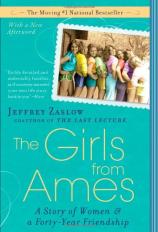Reading Group Guide
Discussion Questions
The Girls from Ames

1. He writes, “I admit that I sometimes asked the Ames girls questions that were silly, obvious, or naïve…And yet I also think that being a man gave me a wider canvas…I made no assumptions. I asked. I rephrased. I tried to comprehend” (p. xv). How well do you think he succeeded? Do you agree that a woman writing about the Ames girls might have been distracted by her own beliefs and experiences? Or might she have considered aspects of their story that Zaslow missed?
2. Did the story of a particular Ames girl resonate more with you than the others? If so, which one and why?
3. After her high school graduation, Jenny’s insurance executive father predicted, “in 15 years, one of you girls will be estranged from the group. Two of you will be divorced. One of you will still be single. One of you may be dead. You have to expect that. Because that’s just how life works” (p. 22). In some ways he was amazingly prescient, but he was way off in terms of how close the girls would remain. How might his predictions have been worded if they had been made by one of the girls’ mothers instead?
4. Despite the religious beliefs of some of the other Ames girls, Kelly “does not hide the fact that she had an abortion when she was twenty years old” (p. 86). Has an issue like abortion ever threatened one of your friendships? In retrospect, are you satisfied with the way in which you and your friend(s) resolved the issue?
5. Zaslow talks about how Ames, with its Big Sister/ Little Sister program, “was actually a town that early on, formally recognized the value of friendship, especially among girls” (p. 106). Discuss how fostering female friendships ultimately benefits a community.
6. After being singled out for criticism by the other Ames girls in high school, Sally told her mother what had happened. She supported and advised Sally, but did not try to interfere. Sally remembers, “this was a great lesson in parenting for me. It is not our job, as parents, to go to coaches, teachers and other parents and try to make everything run smoothly for our kids…Our job is to help our kids function in the [imperfect] world” (p. 122). Do you agree with her assessment? Overall, have parenting styles changed for the better or worse over the past few decades?
7. Zaslow writes, “researchers worry about this current generation of girls…A 2008 study titled ‘A National Report on the State of Self-Esteem’ labeled girls’ low self-esteem ‘a national crisis’” (p. 116). What are some steps that parents and communities should take to stem this crisis?
8. “Few of [the Ames girls’] husbands have long-standing groups of close friends, with decades of history together, whom they confide in and turn to week after week” (p. 101). Yet, just about every year they take over care of their houses and children so the girls can attend a reunion. Do most men appreciate women’s friendships even if they don’t enjoy those kinds of bonds themselves?
9. “Bottom line: Women talk. Men do things together” (p. 102). How does this statement bear out in your own experience? Do you have any close friends of the opposite sex? In what ways, if any, are those friendships different than those with people of the same sex?
10. “For middle-aged women, trying to figure out who they are, one path to self-reflection comes from 10. getting in touch with who they were” (p. 103). Have you taken advantage of social networking sites like Facebook and MySpace to reconnect with people who knew you at an earlier point in your life? Share some of your experiences.
11. From Rod Stewart to Hall and Oates and Grease to Love American Style, the Ames girls’ shared experience of 70s and 80s popular culture bolsters their connection to one another. Why is it that the music and media of our youth is often more meaningful than what we enjoy in our later years?
12. It took Justin, Jane’s husband, to convince her that taking time out to go running would ultimately 12. benefit her two daughters by allowing them to “witness a woman trying to stay fit --- and taking time to do something for herself” (p. 216). Did Jane’s “aha” moment offer any insights into your own life or that of your own mother?
13. The Ames girls abide by some unspoken ground rules: “They don’t brag about their husbands’ jobs or incomes. They talk about their children’s achievements, but not in a gloating way…They make every effort to be with each other for key events in their lives…If they have things that need to be hashed out, it all remains in the group” (p. 288). If you have a long-standing group of friends, what are the “ground rules” that have kept you close?
14. If you are a woman, is The Girls From Ames a book you would recommend to a man? If you are a man, what drew you to read this book? In what ways is Girls a story that transcends gender?
The Girls from Ames
- Publication Date: April 6, 2010
- Paperback: 330 pages
- Publisher: Gotham
- ISBN-10: 1592405320
- ISBN-13: 9781592405329








